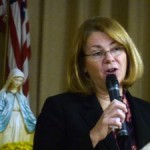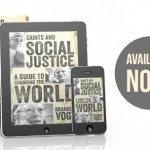Freedom seeks purpose: it requires conviction. True freedom presupposes the search for truth – for the true good – and hence finds its fulfillment precisely in knowing and doing what is right and just. Truth, in other words, is the guiding norm for freedom, and goodness is freedom’s perfection. Aristotle defined the good as “that at which all things aim”, and went on to suggest that “though it is worthwhile to attain the end merely for one man, it is finer and more godlike to attain it for a nation or for city-states” (Nicomachean Ethics, 1; cf. Caritas in Veritate, 2). Indeed, the lofty responsibility to awaken receptivity to truth and goodness falls to all leaders – religious, political and cultural, each in his or her own way. Jointly we must engage in the struggle for freedom and the search for truth, which either go together hand in hand or together they perish in misery (cf. Fides et Ratio, 90).
For Christians, truth has a name: God. And goodness has a face: Jesus Christ.
The faith of Christians, from the time of Saints Cyril and Methodius and the early missionaries, has in fact played a decisive role in shaping the spiritual and cultural heritage of this country. It must do likewise in the present and into the future. The rich patrimony of spiritual and cultural values, each finding expression in the other, has not only given shape to the nation’s identity but has also furnished it with the vision necessary to exercise a role of cohesion at the heart of Europe. For centuries this territory has been a meeting point between various peoples, traditions, and cultures. As we are all aware, it has known painful chapters and carries the scars of tragic events born of misunderstanding, war and persecution. Yet it is also true, that its Christian roots have nourished a remarkable spirit of forgiveness, reconciliation and cooperation which has enabled the people of these lands to find freedom and to usher in a new beginning, a new synthesis, a renewal of hope. Is it not precisely this spirit that contemporary Europe requires?
Europe is more than a continent. It is a home! And freedom finds its deepest meaning in a spiritual homeland. With full respect for the distinction between the political realm and that of religion – which indeed preserves the freedom of citizens to express religious belief and live accordingly – I wish to underline the irreplaceable role of Christianity for the formation of the conscience of each generation and the promotion of a basic ethical consensus that serves every person who calls this continent, “home”! In this spirit, I acknowledge the voice of those who today, across this country and continent, seek to apply their faith respectfully yet decisively in the public arena, in the expectation that social norms and policies be informed by the desire to live by the truth that sets every man and woman free (cf. Caritas in Veritate, 9).
Fidelity to the peoples whom you serve and represent requires fidelity to the truth which alone is the guarantee of freedom and integral human development (cf. ibid., 9). Courage to articulate the truth in fact serves all members of society by shedding light on the path of human progress, indicating its ethical and moral foundations, and ensuring that public policy draws upon the treasury of human wisdom. Sensibility to universal truth should never be eclipsed by particular interests, important though they may be, for such would lead only to new examples of the social fragmentation or discrimination which those very interest or lobby groups purport to overcome. Indeed, far from threatening the tolerance of differences or cultural plurality, the pursuit of truth makes consensus possible, keeps public debate logical, honest and accountable, and ensures the unity which vague notions of integration simply cannot achieve. In the light of the Church’s tradition of temporal, intellectual, and spiritual charity, I am confident that members of the Catholic community – together with members of other Churches, ecclesial communities, and religions – will continue to pursue development goals that possess a more humane and humanizing value both in this nation and beyond (cf. ibid., 9).
Pope Benedict XVI’s Discourse to Civil Authorities and the Diplomatic Corps
Vatican Radio, September 26, 2009











